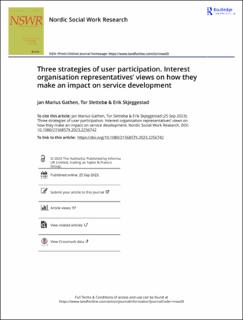Three strategies of user participation. Interest organisation representatives' views on how they make an impact on service development.
Peer reviewed, Journal article
Published version
Permanent lenke
https://hdl.handle.net/11250/3098950Utgivelsesdato
2023Metadata
Vis full innførselSamlinger
- Artikler / Articles [1186]
- Publikasjoner fra CRIStin [1133]
Sammendrag
This paper explores user participation in interest organizations that repre-sent people in vulnerable life situations and addresses the following research question: How do interest organizations seek to influence public actors, and what are the perceived impacts? Data collection was conducted through qualitative semi-structured interviews. We interviewed 14 repre-sentatives from 8 different interest organizations in Norway. Limitations included the fact that there were few informants from each organization and only three with personal service user experience. In the thematic analysis, we developed three themes related to how the informants described their organizations’ dealings with services, municipalities, poli-ticians and other public actors. The cooperative strategy refers to partici-pation as an arena for collaboration and partnership in which they assumedly would share interests and goals. The oppositional strategy shows how the informants would use open conflict and confrontation as tools for influence, often through the media and complaint systems. The third strategy, negotiation, illustrates how organizations would man-oeuvre between being critical and constructive while maintaining rela-tionships with public actors. Interest organizations seem to manoeuvre between these strategies, but they may prefer different strategies depending on their goals and relationships with public actors. Even though all could contribute to service development, the informants expressed that it was easiest to identify impacts from cooperative and oppositional strategies. To improve user participation by interest organi-zations, increased attention should be given to the interaction and power dynamics among the stakeholders. Moreover, increased attention should be given to the impact of these processes.
Beskrivelse
This is an Open Access article distributed under the terms of the Creative Commons Attribution License (http://creativecommons.org/licenses/by/4. 0/), which permits unrestricted use, distribution, and reproduction in any medium, provided the original work is properly cited. The terms on which this article has been published allow the posting of the Accepted Manuscript in a repository by the author(s) or with their consent.

